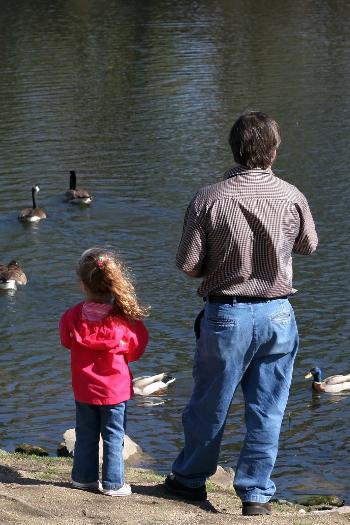Feeding the ducks
Duration/age

Is there a park with a pond near where you live? Are there ducks at the pond? Next time you visit take some duck food with you to feed the ducks.
It’s a sunny day. Let’s go and feed the ducks down at the pond. I wonder how many ducks will be there today.
Talk about the location of the pond. Is it in the middle of the park? Or is it on the edge of the park next to the car park?
We are going to the park with the pond in the middle. We will park the car on the road next to the entrance and then walk to the pond.
Talk about what will happen when you reach the pond. Will it change if there is only one duck? What will happen if there are lots of ducks but you only have a small amount of duck food to feed them with?
There are so many ducks today! There are more than 10 ducks.
When you give the food to the ducks throw it in different directions. If you throw the duck food to different spots the ducks will spread out across the pond.
Materials you will need
- Natural products such as diced lettuce or spinach scraps
- Ducks
Alternative tools
- Duck pellets
Skills this activity improves
Why does this matter?
When your child feeds the ducks at the pond they will be hearing, using and developing language about position, location and measurement. As you talk about how many ducks and how close they are to the edge your child will be using number to measure and to make decisions.
Throwing the duck food to different parts of the pond helps your child to explore moving their bodies through space. As they throw they will be trying to get as close to the edge of the pond without falling into the water. They are developing an awareness of how close or far away from an object to position themselves before falling over.
What does this lead to?
Developing an understanding of space helps children to move their bodies around, between and through different objects and confined spaces. When children combine movement with measurement they are able to predict the best way to move around and how long it will take them.
Talking with your child as you feed the ducks helps them to listen to and follow directions that involve number, position and location. When they are able to hear and follow instructions they know what to do, what will happen next and where to place themselves to be safe. As they develop the language of position and measurement they are able to give directions to other people.
Language to use
- Pond, water, swim
- Middle, side, edge, boundary
- Path, car park, playground, park
- Duck, bird, feathers, wings, beak, webbed feet
- Food, pellets, eat, slice
- Whole, divide, tear, throw, drop
- Small, large, medium, tiny, little
Questions to use
- Are all the ducks the same size?
- Where are the ducks’ feet?
- Where do ducks get their food from?
- How small do we need to make the pieces of duck food?
- Where do the ducks go when it rains?
Useful tips
- Look out for geese at the park. Geese can be very aggressive and territorial.
- Make sure the food you are giving the ducks is in small pieces. Maybe break the duck food up for small children.
- For safety information about young children and water visit www.parenting.sa.gov.au
- Remember to talk to your child in your home language.
More ideas
- Research the different types of food that different species of birds eat.
- Find out about keeping your own chickens or ducks at home.
Variation by age
Birth to two year olds
- Talk about the different sizes and colours of the ducks.
- Sing the song 5 little ducks went out one day.
- Borrow stories about ducks from the library.
- Practice throwing balls into a big bucket before you go.
Three to five year olds
- Count out loud each time you throw a piece of duck food. Can you reach 20?
- Make a map that shows where the pond is at the park.
- Can you make a native bird feeder to hang in your backyard?
Questions to ask
- Which duck is biggest?
- Which duck is smallest?
- Where is the white duck?
Questions to ask
- How many pieces of duck food did you throw?
- Where is the pond?
- Can we park the car next to the pond?
- Do all birds eat the same food?
Language to use
- Big, small
- Colour, brown, green, white
Language to use
- Middle, edge, centre
- Car park
- Bird food, seeds, nectar, nuts, pine cones


